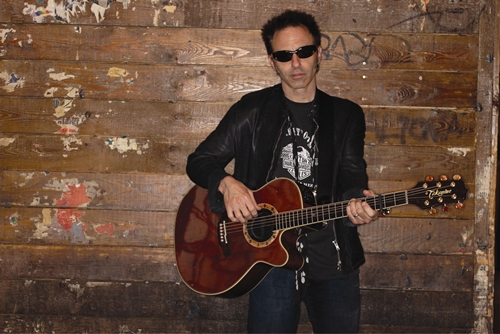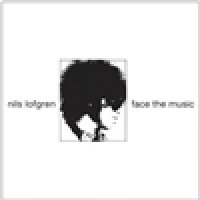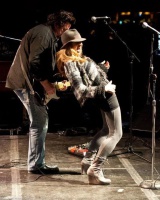Posted November, 2011

I didn’t grasp the meaning of the song at the time nor was I fully aware of who was singing it and who all was on the record. In time, I came to fully appreciate the song, the artist and those who helped put the iconic album together. One of those who helped Neil out on the album with piano and guitar was a young whipper snapper by the name of Nils Lofgren., who was also fronting his own band, Grin.
Lofgren went on to help Young on his next solo album, Tonight’s the Night, as well as serving a brief stint in Young’s Crazy Horse. In the years since then, Nils has crafted 43 solo albums (about which he says, “Ah, gee, I’ve lost count. I’m just thrilled to be making records and have a batch of new songs that I’m able to record and get out to share.”), contributed tunes to such shows as The Simpsons. He’s helped friends like Patti Scialfa and Lou Reed on their solo projects as well as serving two tours of duty with Ring Starr’s All-Starr Band. Most notably, however, is Lofgren’s role as guitarist and vocalist for Bruce Springsteen’s E Street Band.
Lofgren has just completed his 44th solo album entitled Old School, which lands on December 6th.
He called me from his Phoenix area home (and my old home town) to discuss the album. After comparing notes about Phoenix I asked Nils how this album was different from the others as far as how it came together.
“The main difference is that I wanted to do a homegrown thing here at home. Over the years I recognized that I just don’t have patience in a recording studio. I thrive in a live setting where you’re playing in front of a live audience. I tried to come up with some rules and tricks to keep myself engaged.
“One would be that, after I wrote the songs, I would practice performing them until I could sing and play them very comfortably and fluidly as a performance and not even bother recording until I could sing and play the song live very easily. Thus, I went after live vocals in most cases and I think I got ‘em in 10 out of 12 songs. Even with large patches of guitar playing I went with a live approach and took half from this take and half from that take as opposed to crafting line after line kind of thing. So the main thing was to keep as live and emotional as possible even though it was a homegrown singular effort on my part.”
Lofgren shared some details about his home recording arrangement and how he used it to record Old School.
“I have big 8 car, adobe garage. A quarter of it has been turned into a studio where I got all of my equipment out of Maryland where I grew up years ago. It’s right across the yard and I go out there and leave the doors open. My dogs come in and out and visit me. Because I’m not technically savvy my engineer friends upgraded me to a 24 track hard drive. But I don’t use a computer so, rather than have a million tracks, I had 24. I had a Mackie console and I just learned enough to print everything hot and good, clean sounds to tape and not mess it up with EQ.
where I grew up years ago. It’s right across the yard and I go out there and leave the doors open. My dogs come in and out and visit me. Because I’m not technically savvy my engineer friends upgraded me to a 24 track hard drive. But I don’t use a computer so, rather than have a million tracks, I had 24. I had a Mackie console and I just learned enough to print everything hot and good, clean sounds to tape and not mess it up with EQ.
“Finally, near the end of the project, even though 90 percent of it was done in that setting, I went over to a Pro Tools studio called Studio Cat Productions and a local, great engineer by the name of Jamison Weddle. We used that format to actually do the mixing which gave me a lot of freedom for instant recall. You know, you drive around and listen to a mix for a couple of days. It sounds fine then you get an idea and, of course, with Pro Tools you can recall the exact mix and just change that one idea. That was a useful tool at the end for mixing.
“But, in general, it was all in my garage to my 24 track. There’s a remote control as opposed to a computer so everything has numbers going up and back giving me the illusion of fast-forward and reverse – that kind of thing – just to kind of trick my old-school mind into working with this technology and still being comfortable enough to make a record mostly on my own.”
At one point in our conversation, Nils described his home of 15 years in the greater Phoenix area.
“We’ve got two and a half acres of desert land with dogs. It’s kind of a little compound my wife found – a 1935 adobe home so it’s really an old slice of early Arizona history and culture. It’s a beautiful, ancient desert compound. There’s nothing like this around. We are grateful to have it and find it.”
As our conversation comes back around to discussing Old School, I commented to Nils that I got the sense that the album is heavy with nostalgia.
“Gosh, I’m not sure. I guess, in a sense yes. Part of that is that was coming up on 60 years of age – which now I am – it was more of a reflection of acknowledging that, at 60, I’m a lot more schizophrenic and emotional than I thought I would be. When you’re a kid, you look at someone that old like your ancient grandparent. Now I realize – I look at the TV and realize my world is screwed up. I have great anxiety about my planet.
“A long like Miss You Ray talking about losing family and friends but having to look around and acknowledge that there’s some left – how you temper loss with what you still have and temper the pain with gratitude for what is left. Seeing the glass half empty is sort of a knee-jerk reaction as you get older and you have to start paying attention to see it half full – pay more attention to what’s around you and the goodness as you deal with all of the anxieties that come with the planet we’re in, the time we’re in and, also, getting older. And, so, it’s a bit of that – a bit of nostalgia but with a sense of hope for the future tempered by a reality and wisdom I hope sometimes rears its head in my old age.”
One song that I’m particularly intrigued with on the album is song Dream Big. Next to the lyrics printed with the album is a picture of a couple. I asked Nils if that picture was of his parents did the lyrics reflect advice that either of them had given him when he was younger.
“Yes on both counts. My mom and dad, their hobby was dancing. They used to play big band swing music and go dancing every weekend. They were very aware of the therapeutic, healing properties of music and when I wanted to take accordion lessons, for my sixth birthday they paid for them and encouraged me my whole life with my musical endeavors.
“So, yeah, without spelling it out that literally as I do in this song that was their message: Be proud of yourself. Follow your dreams and try to do it with dignity and humility. It’s a very dark, ominous kind of song because now I feel like you gotta do at least that to keep your head above water. You’ve really got to start paying attention. It’s easy to go under with anxiety, doubt and fear and depression.

“At this point I’ve been blessed. I’ve had a lot of ups and downs. Admittedly, I’ve had a fabulous 43 year career in music. My wife does good charity work in town. I do benefits to help her out. We’re looking to – in just a small way – give back and participate in charities whenever we can just to feel like we’re put of the solution even in a small way instead of the problem.”
Another song that I found interesting is 60 Is The new 18. Lofgren shares his thoughts about that song.
“Well, the lyrics are very self-explanatory. Basically, when you’re a kid – anyone who makes it to sixty you have this vision of the old grandpa in the chair, people are running to put his slippers on or get him a drink. He’s revered and respected. The truth is – I have a sense of humor about it – kids just think you’re some old fart. Nobody respects you. It’s like you’re Rodney Dangerfield of your community. A lot of times that can be a funny thing ‘cause people like me have a sense of humor about it. But, for most people, it’s a much more ominous thing. Right now there’s a lot of people around that age are unemployed, serious health issues, and they don’t know where they’re going. There’s a lot of shame and guilt that goes with the economy not allowing for dignity; the racket of healthcare where they’re not looked for and cared for – it’s very demoralizing and shameful adventure for a lot of people.
“Although I experienced some of that angst, I have a great life right now. I don’t know if I’ll have it in ten years with what’s going on today but I get it. I have my own fears. I look at the TV and I’m helpless to fix my world and I’m mad about it. I’ve very, very upset with the governments of the whole planet and with what’s going on and the corruption and the graft.
“This character in this song is taking it to new heights. He’s lost touch with his family. He’s abusing pills, alcohol, drugs. He’s cheatin’ on his wife. He’s miserable. He’s never felt more alone. He’s scared and he’s also full of rage because you just don’t imagine that set of emotions for someone who makes it to sixty. It’s kind of a tongue-in-cheek, dark song about 60 is the new 18 and it’s not just the new 18 to have a beautiful life ahead of you with hopes and dreams. It’s also the 18 of where you don’t know what you’re doing or how you’re going to do it; the insecurity of being young and not knowing who you are or what you want to be. The whole planet is saying, ‘Pick a career. Pick a college, map out your whole life and get it straight, kid!’ What an awful thing! We’re still doing it to our kids!
“I remember having it done to me and it wasn’t even my parents. My parents just encouraged me to try to be happy. But still that’s what the planet did. I’m like, ‘What do you mean pick a career? I don’t even know who the hell I am! I’m a teenager. My hormones – every six months I wake up a stranger and you’re telling me to pick a career?’ There’s people who might not know what they want to do when they’re 30 but at least they’ve found the humility to work, take care of themselves, meet their overhead and have some sort of dignity while they’re looking and all that goes in between.
“The character in this song, he’s past that. He’s 60 now and all hell’s breakin’ loose and he doesn’t know what he’s gonna do. He’s breakin’ out in pimples from anxiety. He’s abusing everything in front of him and he knows it.” Lofgren then quotes a line from the song, “ . . . atone what I can, earn some self-respect, in a world in love with escape and neglect”. He’s learned that – escape and neglect – and it’s rubbed off on him and he’s in deep trouble in that moment in the song. Nevertheless, part of being 18 is having some hope and dreams and I would like to think that at almost any age you can find those but it’s a lot harder when you get older.”
One of my favorites off of the disc is Let Her Get Away that Nils wrote with the late Root Boy Slim. I asked Lofgren for the 
“Oh, man! Are you familiar with Root Boy Slim? He was this genius out of Yale who fried his brain with drugs who was a basket case but functional genius who started writing these songs like Zappa and the Fugs. They’re crazy lyrics – hilarious, witty, and he had great bands. Great musicians played with Root Boy. He was a local, avant garde/Hunter Thompson type hero in our community. We were friends and I’d always go to see him play. His lyrics would either make you cringe or laugh. He was always very thoughtful and surprisingly intelligent.
“One day we were in my backyard in this place I rented in Bethesda, Maryland, when I was living there. We were just talking. It was a beautiful, sunny day and I said, ‘You know? We really out to try to write a song together sometime.’ He said, ‘What kind of song are we writin’?’ I started playing a little melody riff which is the song and we started kind of hummin’ and singin’. The next thing I know, over the course of a few hours, we started crafting a song and it was really feeling good. We stuck with it and finished it in literally one afternoon. It was this beautiful, haunted, kind of a Kris Kristofferson type let her get away/can’t let you get away, too. Again, to me, very metaphorical about the rough times were in. You lose something, you try to get it back and you can’t. You just keep trying to hang on to what you can and trying to find some insight into that journey.
“It’s kind of a mystical song to me. It could even be about the same woman that’s still in your life but the core person you knew 20 years ago – that’s been destroyed by tragedy or whatever. But the person’s still there and you love them and you’re just trying to hang on. There’s a lot of layers to it but it’s a very haunted piece that Root Boy and I wrote years and years ago. I made a demo that was beautiful but it was all so scratchy on a little four track cassette recorder. It was so noisy and I kept debating to share it, noise and all. Then, finally, this record being old school, being a song I love and never been able to share it, I go, ‘Man, stop whining about it! You’re a professional musician. Just re-record it! Get over it! Yeah, it was a great take but, geez! That was over 20 years ago! You can write and sing and play. Just bite the bullet, start from scratch, and make that record again and make it right!” That’s the history of that one.”
Lofgren dedicated the album to his E Street Band mate, Clarence “Big Man” Clemons, who recently passed away. I asked Nils what he feels the world doesn’t know about Clemons but should.
“Geez, they know a lot about him but, you know, even though I stood next to him for 27 years on stage and had a beautiful friendship on stage – very deep musically and personally, I had a greater friendship and gift from Clarence as a friend off stage. We talked every week. From the moment I joined the band he was always there for me and always had a smile and a kind word. He was always someone I felt comfortable with no matter how good or bad my lot was on that day or that point. I always felt that he was a great confidant and sounding board for any and all trials and tribulations, good and bad. I do miss him and am heartbroken that he’s gone. I have a lot of great memories that I’m trying to hold on to. I believe he’s up there, glad that I’m carrying on singing and making music and trying to value every day I can. We miss him terribly.”
It’s easy to guess that Nils must own a store full of guitars and other instruments. I was curious if there was a guitar that he considered a “holy grail” and if he owned it.
“Well, you know, I’m an accidental collector. I’ve probably got a hundred and some guitars that I didn’t really set out to collect. But I’ve been on the road for 43 years. Of course a lot of that is a function of being the swing man now in the E Street Band for eleven years where I’m playing dobro’s and bottlenecks and lap-steels and six-string banjos and that’s a whole other dozens of instruments that aren’t technically guitars but are in that family.
“But I have to say, as far as seeking anything, I couldn’t think of one. By far, the most treasured guitar I have – which every guitar you hear on Let Her Get Away is this old, funky D18 that Neil Young used to write on. When we did After The Gold Rush – if you open the album, he’s laying on a couch at the Troubadour – there’s a shot of Neil Young on a couch and right next to his head is a guitar leaning against a wall. It’s this old D18. When we were doing the sessions, he needed me to play guitar and he said, ‘Get your acoustic’ and I said that I didn’t own one. So he said, ‘Here, borrow this one’ and he gave me this guitar. I used it on Tell Me Why. I played it on Till The Morning Comes and, after the end of the sessions, he said, ‘You know what? You can keep that guitar as a gift. Thanks for helping with this record.’ I was so freaked out. I remember we were up in the hills in Topanga Canyon. I grabbed that D18 without the case and I ran about a hundred yards in the deep woods. I just got lost in the forest, sat there under a big tree and just played it for hours. Then I walked back and, from that day on that was mine and it’s certainly my holy grail of guitars. It’s old and funky. It’s all beat up. It’s not like this rich, beautiful, classy sound. It’s kind of a funky sound. I used it on my Nils Sings Neil album where I play Neil Young songs live in the home. Obviously, that’s the only guitar that I could use for that record. But that would be my favorite – my most special, historic guitar.”
When I asked Lofgren what he still would like to accomplish in his career, he chuckled and said, “Oh, geez, I guess the obvious thing would be that I would like to think that this new record is as good a record as I’ve ever made. I’d like to keep getting better at making records and performing even though I don’t have a record company and I’m not on the charts and all of that. More and more, people keep discovering me because I’ve gotten better at sharing musical ideas that are emotional and inspiring to people to where I find a larger audience through getting better at what I do. I’m a performer at heart.
“I don’t dream of stadiums. I just dream of a larger audience to where you’re playing theaters and you bring your own stage and sound and lights and you can control the thing more. Because of the larger audience, you can bring a five piece band and crew and have lights and sound – have the freedom to really delve into creating a show. That’s where I’m at my best and most engaged is in the live setting. So, that’s all: Just keep getting better at what I do. I think that this is a great record. I think it has that potential. Whether it happens or not, my job is to keep getting better at what I do.”
As for tour plans to support Old School, Nils said, “I’ve got a couple of shows in February in Virginia. They’re kind of an annual performance there at the Birchmere in Alexandria, Virginia, with my brothers and Greg Varlotta who’s working with me on our duet show. We do an acoustic duo. That’s it. I’m laying low for awhile, promoting the record, work on a video or two and hope to promote the record most of next year and get to a lot of places.”
As our chat was wrapping up, I asked Nils Lofgren how he would like to be remembered and what he hopes his legacy would be. As he was with the first question I asked him, his answer to this question revealed a man who takes such things as life’s meaning very seriously. That comes from experience – especially the experience of losing friends and loved ones.
“Oh, man! You’re killing me here! I mean, honestly, to give you a respectful answer, I might take an hour of thought. You know what it is? I feel – and you can see it as kind of a theme throughout this record – I feel like I’m learning and growing. I feel that way not just musically but as a person. So, I’m hoping – whether its two months or two years or twenty years or forty years, I’m going to be able to give you a better tombstone than what I come up with today. I’d rather it be a work in progress towards something a little more useful and practical legacy. Something a little more substantial to offer than I have today – not that I don’t feel like I’m a decent person. But I’d like to think that that’s a work in process and, hopefully, I’ll have a little more time to create a better answer to that.”
Whether you’re old school or new school, if you still want to go to school to learn how to play the guitar and unleash your inner rock star, then Nils can help you. Simply click go to NilsLofgren.com and follow the links to the school. Once there, you can pick and choose from the wide range of lessons offered there. You’ll learn great blues riffs and scales, various chord progressions and picking techniques. Not only are the lessons offered in English but also in Spanish and Italian for those who are more comfortable communicating in one of those languages. Be sure and check it out.
And, while you’re at NilsLofgren.com, you may as well sign up for his mailing list so that you can stay in the loop as to what all is going on in his world. You can be sure that he’s always up to something interesting and creative.









